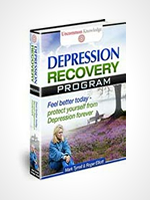Depression Medication / Drugs - how it works
"Despite extensive development, no one type of depression medication has been shown to be more effective than any other"
THE MAIN difference between types of depression medication, (marketing and cost aside), is in the limitation of side effects. A huge amount of research continues into how drugs affect depression sufferers, and each finding reveals a new twist.
What is obvious is that despite each new development in depression medication, depression is still on the increase.
By considering the side effects of medication, the wide range of conditions these drugs are used to treat, and the "hit and miss" success of depression drugs, what is clear is that prescribing medications for depression is far from an exact science.
In fact, most drug companies will freely admit they don't really know how these drugs work in treating depression. For example, recent research show that despite their name SSRIs, Selective Serotonin Reuptake Inhibitors, may actually work by affecting levels of glutamate, not serotonin.
Here we'll look at how antidepressants work, or at least how they were intended to work.
|
"Regarding depression as "just" a chemical imbalance wildly misconstrues the disorder. "It is not possible to explain either the disease or its treatment based solely on levels of neurotransmitters," Yale University neurobiologist Ronald Duman, Ph.D., |
Given that this is the basis on which all depression medications work, we can begin to see how developing effective treatments for depression must go beyond medication. Effective treatment must treat the causes of depression, not just the symptoms.
Types of depression medication
Antidepressants were first used in the late 1950s. Now they are divided into three main classes:
- Tricyclic drugs (TCAs). (sold as Amitriptyline, Imipramine)
- Monoamine oxidase inhibitors (MAOIs) There are three types of MAOIs, phenelzine,(Nardil) isocarboxazid and tranylcypromine, ( Parnate) and moclobemide.
- Selective serotonin reuptake inhibitors(SSRIs) - were developed in the 1980's and are the most common prescribed today. They are sold under brand names such as Prozac, Paxil, Prozac, Luvox, Zoloft, Celexa.
Newer "reuptake inhibitors" work on blocking the reuptake of different neurotransmitters (brain chemicals). Serotonin and norepinephrine reuptake inhibitors are becoming popular. (SNRIs)
In general SNRIs cause fewer side effects than TCAs and MAOIs.
Another type is Bupropion (Wellbutrin) - which is a dopamine reuptake blocking compound. It acts on the neurotransmitters dopamine and norepinephrine.
Tricyclic agents are used in the treatment of:
- depression
- panic disorder
- obsessive-compulsive disorder
- post-traumatic stress disorder
- occasional chronic pain.
SSRIs are used in the treatment of:
- depression
- panic disorder
- obsessive compulsive disorder
- bulimia nervosa
- social phobia
MAOIs are used for all types of depression. They have also been used when 'atypical' features were present with the depression such as excessive sleeping, over eating and anxiety.
If you are on antidepressants they may have a different brand name but will generally fall under one of the types mentioned above.
The most commonly prescribed drug type for depression is the SSRI, due mainly to their apparent safety in overdose, compared to others.
How effective is depression medication?
Many people find great relief by using antidepressants. They can be effective in giving a quick response, to relieve suffering in severe cases of depression. But the long-term use of antidepressants is far from the being the answer to depression. Also, as we have seen, if you are depressed, you need to learn the skills necessary to avoid depression in the future, not just treat the symptoms with drugs.
And despite drugs companies trumpeting SSRIs as 'the answer' to depression, newer antidepressants have just the same success rate as older ones.(1)
Although in the UK, drugs companies cannot advertise their brand-name drugs, this is not the case in the US, Australasia and elsewhere.
This article gives a clear description of the research: Does depression medication work? (Psychology Today)
The hard facts - depression drugs and relapse
Antidepressants are shown to be effective in controlling depression in around one third of cases with partial success in another third, but are ineffective in the remaining third.
But where drugs as a treatment for depression really fall down is on the prevention of relapse.
Other, alternative treatments such as cognitive behavior therapy, have been shown to have 70% better success rate at beating depression for good. In other words, they have been shown to prevent relapse in 70% more cases than drugs.
But this is obvious! Unless, of course, you consider the cause of depression to be a chemical imbalance. Which we know it is not, in the majority of cases. (See earlier in the Depression Learning Path.)
Since almost all depression depends to a major extent on peoples' situations and how they respond to them, why should drugs prevent relapse?
How do antidepressants work?
Since the breakthrough discovery about depression and dreaming, detailed earlier in the Learning Path, we now know that all antidepressant drugs inhibit the amount of REM sleep we get, reducing the amount of dreaming and so exhaustion. Once again, however, this is treating a symptom instead of the cause of the over-dreaming. Once new styles of thinking are learned, and lifestyle changes made, over-dreaming naturally ceases.
This gives a clear indication why relapse is common on depression medication alone. And what about long term use...?
Related: Depression medication withdrawal
Next article: Controlling Depression with Antidepressants
- Newer and Older Antidepressants have similar efficacy - Anthony J. Pelosi, MRCPsych, Liz Ashton, MRCPsych, Hairmyres Hospital, Glasgow, Scotland, UK "This meticulously done meta-analysis highlights that the evidence does not address all common clinical problems. Insufficient research exists to guide prescribing in mild, severe, treatment-resistant, or comorbid depressive illnesses. We cannot depend on the pharmaceutical industry to guide the use of important and widely used medications; 94% of the antidepressant studies for which a funding source could be identified were industry financed. Health maintenance organizations, insurance companies, and especially governments should take note."







